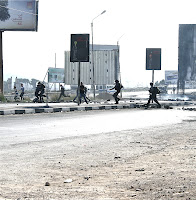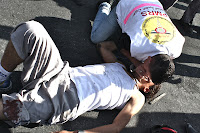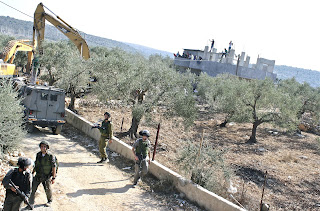The
following blog post is an update of what John and I have been doing, including
a few personal observations.
It
has been awhile since either of us last wrote. The
olive season is in the books. Hopefully next year will provide a more bountiful
harvest for Palestinian families. We were told this season was about 20% as
fruitful as the previous one.
The
most notable occurrence since our last blog post was the recent conflict in
Gaza. Hamas fired homemade/ Iranian built rockets, Israel conducted airstrikes
with American made F-16 jets which dropped precision munitions on targets in
Gaza in addition to rockets fired from naval vessels in the Mediterranean. The
shelling lasted for just over a week before a cease-fire was brokered. The
final death toll symbolizes the asymmetrical balance of power and resources between the seemingly
intractable sides – 6 Israelis and 169 Palestinians killed.
We
have done a lot of reading, from many different sources, and come to the
conclusion that the majority of articles/reports about the conflict published
by mainstream media sources are inauthentic representations of what has
objectively transpired to date. Consistently the patina of objectivity is used
to belie the ‘Israeli as a victim of aggression acting in self defense’
narrative. This position further justifies the Occupation and the violent
actions of fundamentalist settlers. But it is up to the reader to get
informed and then form his or her own opinions about the struggle.
Gas & Stones
 |
| Soldiers move in to arrest two protestors. |
 |
| When the gas comes you run. |
After
seeing this kind back-and-forth many times, and after inhaling a great deal of
tear-gas myself, I began to see the fruitlessness of that action. The question
came up… what are these young men achieving besides getting out some of their
Occupation-generated anger? - Which, in my opinion, is completely
understandable, but really not the best way to achieve a just and peaceful end
to the struggle. There must be alternatives to the stones and gas.
Habibi come to Tabib
A few days later John and I went to a public demonstration in Izbat Tabib, a very small town, near several settlements in the Qalqiliya District. Altogether it was a very different demo than any we had been to thus far.
When
you turn off the main road, toward Tabib, there is a red and white sign warning
Israelis that they are entering an area where Palestinians live and is
accordingly very dangerous. That type of misleading language can be very
powerful. Take for instance the military title of Israel’s most recent Gaza
shelling – “Operation Pillar of Defense”. As John (my colleague) eruditely
notes the Israeli military narrative is simultaneously part victim and part
aggressor.

In
Tabib locals are concerned with cultivating a very different and unifying
narrative. Most Fridays a group of Israeli activists bus into the no-stoplight
town to participate in an inter-cultural theatre group. They march together
with Palestinians, including many children, past the red and white sign,
down to the nearest main road. There they chant in Hebrew, Arabic and English.
Our favorite chant and when we tend to yell the loudest is… "One, Two, Three,
Four… Occu-Pation No More… Five, Six, Seven, Eight… Stop the killing, Stop the
hate.”
 |
| Protestors march together in Izbat Tabib. |
After minutes of peaceful yelling a handful of soldiers circled our group of about 40 protestors. This went on for a while and they, the soldiers, seemed to have no idea what to do. They made calls and more soldiers came with several armored vehicles. The merry group of protestors then created a semi-circle and began to act out their different interpretations of the struggle and the affinity they have for each other. After an hour or so everyone went home rather satisfied, well I cannot speak for the soldiers who remained perplexed as to what had just transpired, but we were pleased with the action.
We
went home feeling much different than we normally do after the usual demonstration. The rock and gas demos leave us with mixed feelings; a potpourri of anger, frustration, and powerlessness. After leaving Tabib I felt good about what had just happened; we witnessed
collective action between Israelis and Palestinians at a personal level, a
powerful statement in such a divided land.
John and Sam






























